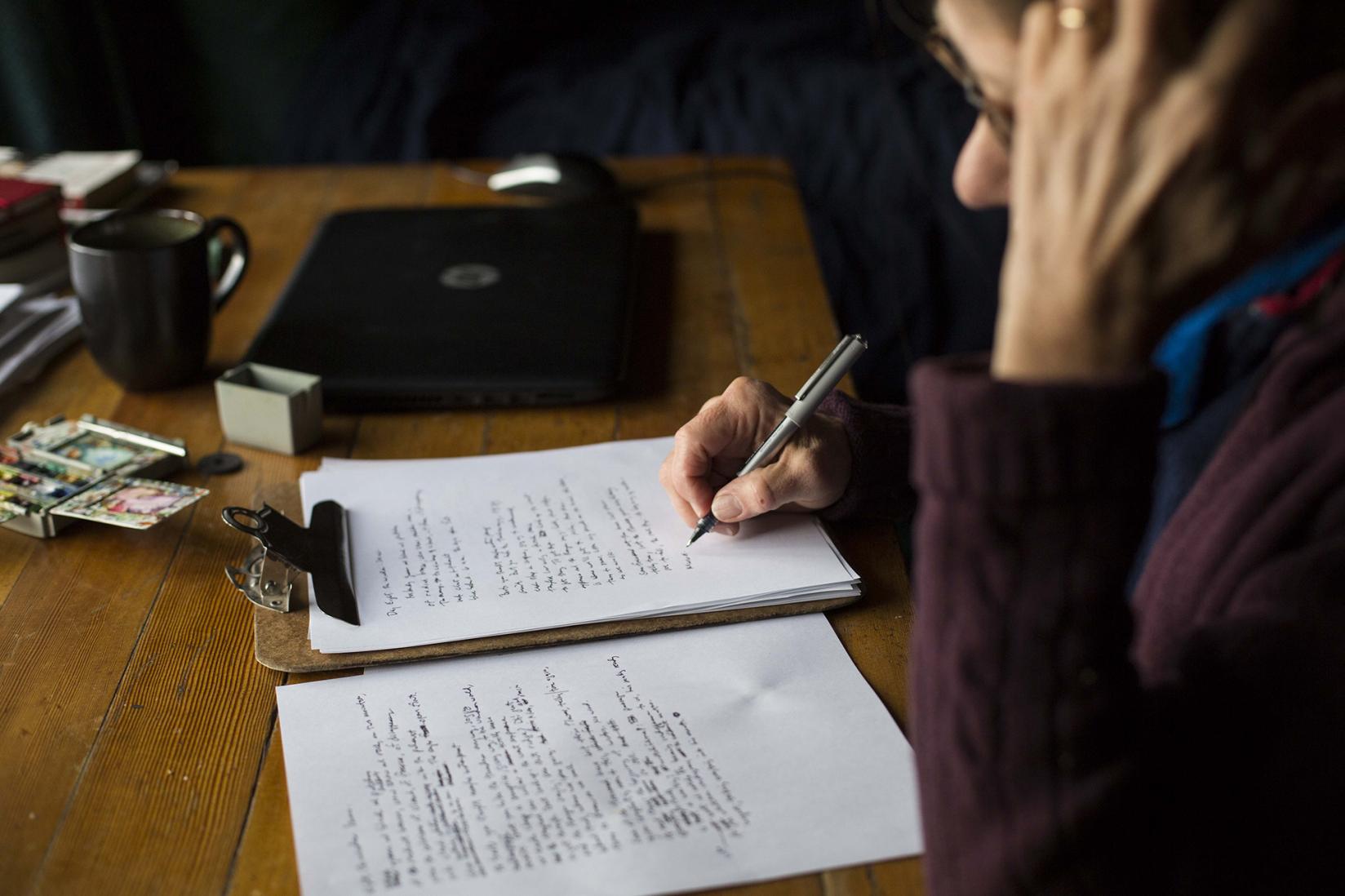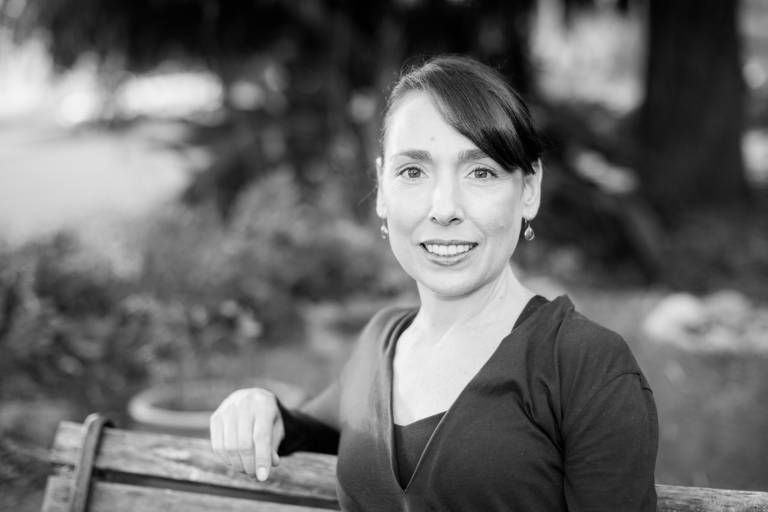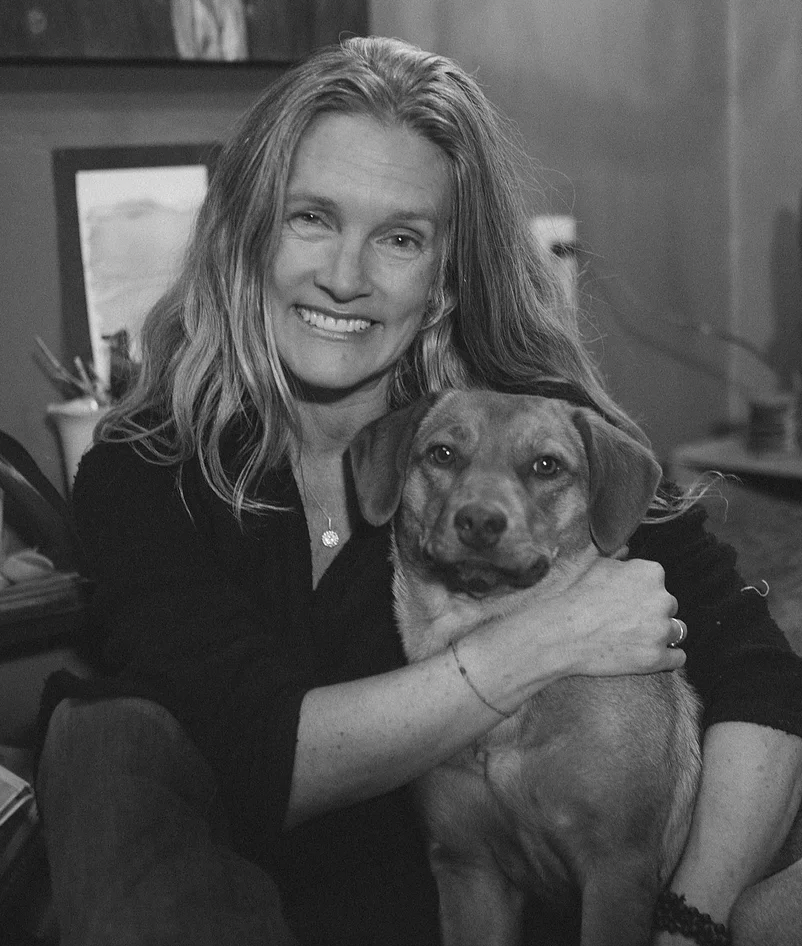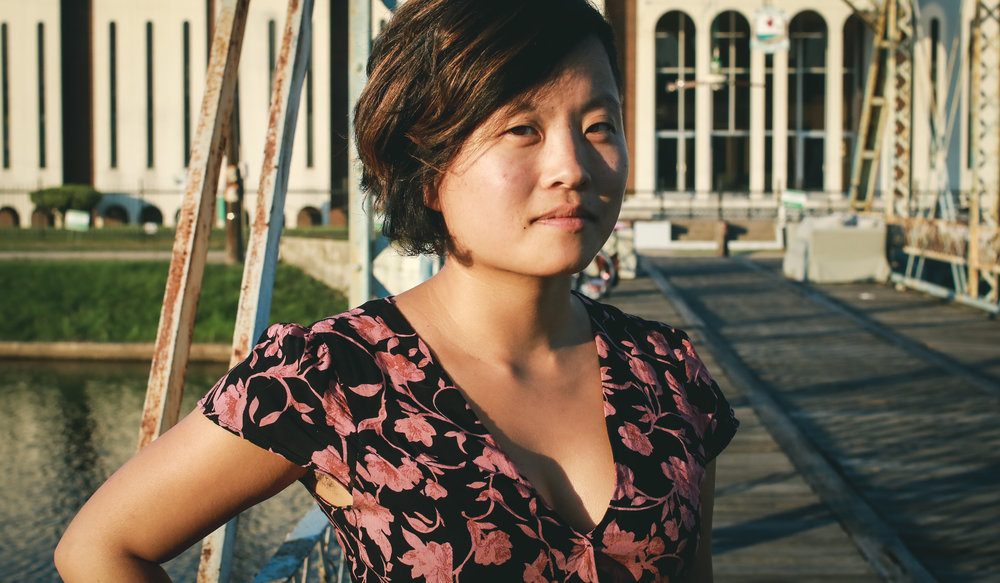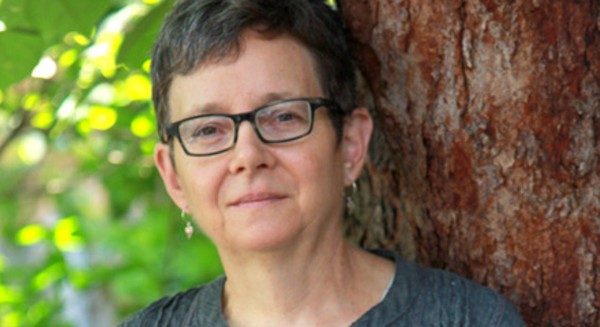Upon Seeing a Squirrel, Dead, by Natural Causes
By Rodney T. Jack
Scampering down from the hemlock,
over the snowbed, light as snow
itself uncompacted. Discretion
in such dire matters I admire.
Roadkilled by me, speeding
on my made way, causing this display—
the body in dishonor of a higher pact
to hold one’s self in mind
agile and fast.
Couldn’t it have just died in the nest,
the elements carrying the body and spirit off?
Or have a raptor do the work?
I ask questions I don’t care
to learn the truth about.
I love to hear myself
talk, exhibit my terminal illnesses
for family and friends to remember me by.
Instead of falling in the out of doors,
in clear view of the world.
Each semester, Friends of Writers awards a scholarship in memory of Rodney Jack, established by MFA Alumnus David Lanier (poetry ’94). Below is the essay by Leonard Jack Jr. in celebration of his brother’s life, alongside an additional poem by Rodney.
Celebrating the Life and Love of Rodney T. Jack
By: Leonard Jack, Jr.
My four brothers and two sisters—all of them—mean the world to me. There is nothing I would not do for any one of them or any other family member. My family, like most families, is composed of individuals who are different with regards to religious beliefs, political affiliations, educational levels, sexual orientation, occupations, and others. Regardless of life perspectives and identities, we are a family who cares deeply for one another.
Ironically, our oldest brother received a call from Rodney days before he committed suicide. Rodney shared that he wanted to return home, and that he could not find employment. My brother encouraged him about opportunities that he would be afforded, given that he had an advanced degree. Rodney’s entire family remains heartbroken that his return home was not the way any of us had ever envisioned.
I shall never forget receiving that call from the police detective on Wednesday, August 6, 2008, inquiring whether I was the brother of Rodney Jack; my incredible fear for what he was about to tell me; and hearing him say that my brother took his own life. The detective was very patient with my failed attempt to pull myself together. He asked if I had any questions and showed great patience as I went through each question with him. It was extremely important to learn everything that he knew about Rodney. He was honest in his responses.
The detective indicated that he had been given my telephone number as the person who should contact the coroner’s office to make the necessary arrangements. Immediately, I called Wayne Johns, Rodney’s life partner, whom I have known since the beginning of their relationship, to find out how he was doing. Although I was out-of-town, attending a conference at which I was scheduled to serve as a guest speaker within minutes of receiving the call from the police detective, my topmost priority was to take care of my brother. I cancelled my presentation and took the first flight, possible, home. En route I began communicating with family members while listening to heavy hearts and making plans for Rodney’s return home to Baton Rouge.
Everything moved very quickly. Decisions had to be made so suddenly that I did not have time to think about how I felt after receiving the shocking news. My only thoughts were about being there for my brother and everything that was important to him. Wayne later shared that Rodney’s suicide left him devastated and debilitated. With everything that had been placed before me, under the most demanding, unimaginable circumstances, I remember making Rodney a promise that my best would be done and everything I had would be given. Arrangements were made for Rodney, with my intentionally informing Wayne at every step along the way – selected clothing, funeral preparations, burial site location, and the program developed for Rodney’s funeral service. I also intentionally included words from Rodney’s mentor, Ellen Bryant Voight, in the funeral program that indicated:
“In the winter 2003-2004 issues of Poetry, his mentor, teacher, colleague and friend, Ellen Bryant Voight, had this to say about Rodney’s writing: His poems are marked by a welcome, persuasive, classical restraint. The poet’s sensibility, and the particulars of his autobiography, smolder behind all his work, but his gifts for the telling detail, for a moving intimacy of tone, and for a syntax both suggestive and energetic, are reserved for looking out, at the baffling world.”
The program also included an acknowledgement of his colleagues and friends. The eulogy shared information provided by Wayne Johns from various sources. I shared with everyone comments from Rodney’s student evaluations; acknowledged his having been awarded the Warren Wilson Holden Minority Scholarship; and mentioned the numerous awards he had received. We asked attendees to pray for my mother and Wayne’s mother. It was vital to ensure that Rodney’s entire life, from childhood to adulthood, was shared with everyone. While under the most demanding circumstances of trying to put my deceased brother to rest with dignity, attending to our terminally ill mother, and supporting my devastated siblings (and other family members), I deliberately took pictures of Rodney (from his funeral) and had them delivered overnight to Wayne. This was difficult for more than one reason, yet I did it for Wayne. Wayne did not ask and I did not expect him to ask me to do so. Upon receipt, Wayne responded, indicating that Rodney looked at peace. My belief was that I was doing what my brother would have wanted from me.
Wayne sent me Rodney’s official discharge paperwork from the U.S. Navy, thereby helping me to secure his rightful place in Port Hudson National Cemetery, Zachary, LA. Rodney received a full military funeral service to include the folding of his U.S. flag, taps, and a 21-gun salute. For all military veterans buried at Port Hudson, up to 15 characters are allowed for engraved words on their respective headstones. Neither I nor any family members decided how those 15 characters would be used. That honor was reserved intentionally for Wayne who chose the most befitting words. The words were: Poet & Catalyst—15 characters exactly. The word poet was obvious given Rodney’s accomplished career as a poet—a passion the two nurtured together. Wayne shared that he chose the word catalyst because he felt Rodney was “a person whose talk, enthusiasm, or energy causes others to be more friendly, enthusiastic, or energetic.” We (Rodney’s family) thought Wayne’s chosen words offered a symbolic final way of celebrating and memorializing their life together; our family’s love for Rodney; and his many gifts. We also felt these two words would help the hundreds of annual visitors know about the tremendous man resting in the historic Port Hudson National Cemetery. Rodney’s engraved headstone can be viewed, anytime, at https://www.findagrave.com/memorial/54633609/rodney-twyman-jack#view-photo=125156152. His final resting place shall forever receive the care and attention that is appropriate for a brilliant man who meant so much to so many and who served his country honorably.
My love for Rodney, then and now, is unconditional and endless. There has never been and shall never be, anything that could force me to turn my back on him—NOTHING. Therefore I have always been there for him, never desirous of making any of his decisions. I have experienced it all with Rodney; nothing has ever scared or turned me away. He determined who remained in his life, no matter how short or long the duration. Rodney chose what information, and with whom, he felt most comfortable sharing about his personal life. Across the many writings about Rodney (captured in response to his death), many write that they found him to be funny; many wished they knew him better. Others indicated they learned more about my brother from reading and spending time interpreting his poetry. This theme appears across the numerous published writings and emails shared with me regarding Rodney’s passing and his impressive body of literary work. August 6 of this year (2021) will mark the 13-year anniversary of his death. Mr. David Lanier’s writing, dated March 15, 2019, evidenced that there are still concerns/questions as to why Rodney’s poetry has not been published (https://friendsofwriters.org/2019/03/15/david-lanier-poetry-94-on-the-poems-of-rodney-jack-poetry-99/). There may be the perception that I (and his family) did not value Rodney; respect his lifelong relationship with Wayne Johns; and, for no reason at all, made a unilateral decision not to support the publication of his poetry. First, the family has no reason to object to anything that Rodney felt was important to him—what he wrote about, where he chose to submit his writing, when it was submitted, with whom he chose to collaborate, who he chose to love, causes that motivated him and his actions, and the extent to which he chose to interact with others.
Rodney was always an independent thinker and doer. He would let you know this during the best and worst times in his life. Rodney decided what he wanted to give, to whom he wanted to give anything, for how long, and with what he felt most comfortable receiving. Despite numerous people having written about their interactions with my brother, Rodney was his own decision-maker regarding matters that related to his life before and leading up to his death. His family and I have always known and respected this about our dear Rodney.
We were never ever remotely ashamed or embarrassed about any topic (those published or yet to be published) about which he wrote, how he wrote about them, or why he wrote about them. Anytime there was a poem published by Rodney, his family celebrated the achievement. We followed Rodney’s work even without his letting us know that his work was published or that he was bestowed with prestigious awards. When we had an opportunity to talk with him over his lifetime, we would mention that to him, and it always warmed our hearts seeing him both surprised and appreciative. Rodney was always loved by his family, regardless of whether there were periods of time when he either did not believe it or felt loved, valued, and appreciated.
It is unfortunate, but true, that Rodney chose not to establish a will or appoint an executor over his literary estate. Further, our family learned, initially, from Wayne that Rodney purposefully deleted everything from his computer. It is less clear how information from his computer was retrieved. Don Share, former Chief Editor of Poetry magazine, wrote “Rodney Jack was published in a number of well-known magazines including Poetry, which awarded him its Eunice Tietjens Memorial Prize in 1999, but he committed suicide not long ago; he erased the hard drive on his computer that contained most of his work, though the poems were apparently recovered by his partner Wayne Johns (https://www.poetryfoundation.org/harriet/2011/04/poetic-fashion-and-unfashion-on-literary-outliers).” Elsewhere, Mr. Lanier writes “One day, in early August, 2008, he erased all the poems and drafts contained on the hard drive of his computer. He then committed suicide. Luckily, Rodney’s partner Wayne Johns had regularly backed up his and Rodney’s computers and so was able to recover most, if not all, of the poems Rodney wrote (https://friendsofwriters.org/2019/03/15/david-lanier-poetry-94-on-the-poems-of-rodney-jack-poetry-99/).”
Rodney’s decision to erase all his poems, not establish a will, and/or legally appoint a literary executor is not a negative reflection on his family, Wayne, or anyone else for that matter. It is not necessary for me or anyone else to understand all his decisions and all the reasons why. Years later, the one thing I am 100% clear about is that he did his BEST.
A few years after Rodney’s burial, it was brought to the family’s attention that a book was nearing completion and that a response from the family was needed somewhat immediately to advance the publication of a book of Rodney’s poems. Initially this was exciting news. The reality quickly set in that there was a lot of information to absorb. After having opportunities to ask the publisher, Sarabande Books, Inc., several questions, and with time to carefully review historical emails, one major concern was raised. My major concern was that the person initially asked to write the book’s introduction also made edits to Rodney’s original poems and that these changes were approved by Sarabande Books, Inc. Rodney went through all the necessary training (before, during, and after receiving his MFA degree) and had established himself as a professional poet. It was difficult for me to see why his poetry could not be accepted and published without modifications. It would bring Rodney the greatest joy to know that he was accepted for not only his sexuality, racial/ethnic identity, love for Wayne, training at Warren Wilson College, and contributions to developing students, but most importantly, his poetry as he originally intended. In essence, publishing Rodney’s poems without alteration would allow him one of the highest expressions of his being and an honor. There surely were reasons why Rodney chose to create every sentence; place every punctuation mark; and make careful use of the second person; and others. Readers can certainly apply their gifts to interpret the meaning behind Rodney’s writings, but I would submit that his writings should be, like those of any other author, that of his own.
On June 17, 2014, Wayne and I did reach an agreement. Wayne proposed that he would serve as the literary agent on Rodney’s behalf, with the understanding that everything is published in Rodney’s name without modifications, and that we work closely to resolve any potential difficulties along the way. I had previously mentioned to Wayne my interest in establishing a non-profit organization in Rodney’s name that would support the development of undergraduate and/or graduate students, with funding from me, other sources, and the sale of Rodney’s published works. Wayne and I discussed these arrangements by telephone with my attorney who, in turn, approached Sarabande Books, Inc. Its response was that there was no interest in revisiting the possibility of moving the book project forward.
It is exciting to see that David Lanier has established a scholarship at Warren Wilson College, named in honor of Rodney T. Jack. This is an incredibly generous way to celebrate his life and advance the vision of the College’s Creative Writing Program. It also is admirable that the scholarship will help build the skills of future LGBTQ writers. On behalf of Rodney’s family, I sincerely thank Mr. Lanier for making this possible. We, too, shall continue to implement ways of celebrating the life and love of Rodney. The sharing of my brother’s suicide with colleagues, friends, and even strangers has revealed an important life lesson. There are many of us surviving the loss of a loved one from suicide — some due to obvious signs, while there is an equal number whose signs are never noticed. All of us have experienced a tremendous amount of shame and guilt—some superimposed upon ourselves or by having allowed others to impose the shame and guilt upon us and perhaps a combination of the two. The truth is that we must do everything we can to love our family, friends, and colleagues by cherishing every precious second available to us. My family shall continue its efforts to share Rodney’s life story, promote diversity in writing to include racial/ethnic minority groups, LGBTQ rights, social change, gender issues, and the stigma associated with individuals living with mental health conditions, as well as family, friends, and loved ones who are courageously choosing to support them.
Rodney’s family continues to have discussions and remains hopeful that one day Rodney’s unpublished poetry (as he originally wrote it) will be shared with a broader audience. Meanwhile, my entire family prays that the poetry community will continue to surround Wayne with sustained love, support, and comfort throughout his recovery from the deep grief over Rodney’s death—no matter how long the process might take.
Oneliness
By Rodney T. Jack
Since we’re mostly alone
most of the time
in our dreams, or lack thereof,
our oneliness peopled by phantom figures,
none of them tactile, within reproach,
does it stand
to reason one’s reliance on I?
For example, driving alone,
in another’s truck,
I am on my way
(having passed it twice or more)
to the convenience store.
